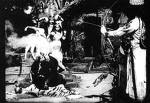 There were many likable aspects to this peculiar little book, according to Kate and Amardeep but not Narayan, and Ann reserves judgment until she has more time to read.
There were many likable aspects to this peculiar little book, according to Kate and Amardeep but not Narayan, and Ann reserves judgment until she has more time to read.Narayan's main objections were the disjointed aspects, lack of structure, and his feeling that it closely resembled Kenneth Anger's Hollywood Babylon.
Amardeep and Kate acknowledged some queeziness about the gossip angles of the story, but feel it is more than redeemed by the personal depiction of the costs of Partition, as symbolized by the split of friends like Manto and Shyam. Favorite characterizations: Kuldip Kaur, Shyam, Rafik Ghaznavi, and Nargis.
Things that I learned that might be helpful to other readers:
All Bollywood films until the 70s or 80s were in Urdu, and switched to Hindi or Hindustani only after. Still now Urdu is more highly regarded as a poetical language, and many see the switch as a downfall.
Seth means boss, and may denote upper caste boss.
I thought it odd that Babu Rao Patel had two wives, (see p. 187 one was a doctor!) then I learned that Hindus also could marry more than once up until the 1950's.
Near the beginning of the book, the sections where Manto discusses the threats of communalists against his Hindu studio bosses, (p.17) we really got the idea this was the kernel of the idea for our previous book Filming.















